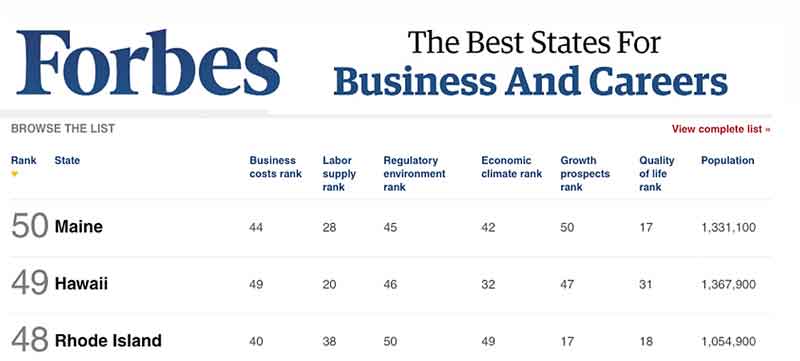“Thank God for Mississippi.” That’s what we used to be able to say when any national survey would show that Mississippi was always last in the nation — economy, health care, obesity rates, etc.
Now Forbes magazine, for the second year in a row, has listed Maine 50th among states for business and careers. Mississippi is ranked 48th, with little Rhode Island next to last. Now it’s Mississippi’s turn to say, “Thank God for Maine.”
That’s OK, but when our own state officials and business leaders take Forbes seriously, we’re in trouble. They’ll wave the Forbes survey in our faces as they go about lowering business taxes, wiping out environmental regulations, going for cheap energy at any cost, cutting social services and anything else they can get their hands on.
Before we jump off a cliff, let’s take a good look at the survey.
It ranks states by six categories: Business costs, including taxes and energy; labor supply; regulatory environment (meaning the fewer regs the better); economic climate; growth prospects, and quality of life.
Who’s number one overall? Utah. Yet Utah’s quality of life is two notches below Maine (at 18), and it no doubt scored high points in regulatory environment and business costs categories by initiating the first above-ground tar sands mining project in the country. The state is leasing 7,800 acres of state-owned land to a Canadian company to begin turning that land into a toxic industrial wasteland. Luckily, we have no tar sands in Maine.
So, who’s number two? Virginia, which had been number one for several years. To get a true picture of Virginia’s economy, just imagine the state as a totally engorged wood tick whose head is firmly muckled against our nation’s capital to the northeast, and sucking out more than its fair share of federal wealth.
Quality of life? Massachusetts is No. 1, New Hampshire, No. 2, Connecticut, No. 3, Minnesota, No. 4, and New Jersey, No. 5.
New Jersey? I won’t argue that the first four weren’t the right choice, but to choose New Jersey over Maine (by a long shot), ignores its foul air, suburban sprawl the length of the state, and its permanent traffic jam. It also ignores our state’s working motto: “We don’t want to be another New Jersey.”
So, which state has the lowest quality of life? Louisiana is 50th; New Mexico is 49th, and Mississippi is 48th. Can’t argue with that.
Where do we go from here?
Forbes has done us an enormous favor. It makes no sense to beat our heads against the wall trying to get to 49th or 48th. Even getting to 25th wouldn’t endear us to big business.
First, let’s abandon all schemes to entice large businesses to Maine by slashing taxes, regulations and social services. Our energy costs will remain high, our population is the oldest in the nation, and all that slashing will bring down the quality of life to about where Louisiana is now.
And it wouldn’t do anything to attract those businesses who are apparently flocking to Utah. The state with the lowest business cost is South Dakota, followed by Wyoming, North Carolina and North Dakota. You couldn’t pay me to live in any of those states.
Instead of prostrating ourselves at the altar of big business with hare-brained economic development schemes, let’s try this:
The local economy is the only real economy worth developing.
A recent study by the Maine Center for Economic Policy says that we would be much better off recruiting and supporting local business, rather than those “from away” (my term). That’s because locally based businesses put more of their earned income back into the community.
The best part is, we don’t need a huge transformation in state or local government policy. We just have to change our buying habits, our banking habits and our eating habits. Go to the local hardware store rather than the big box store, even if the price may be higher. Often it’s not.
Bank at your local savings or commercial bank, not the multinational one down the street. Buy your food at the local supermarket, but buy fresh, whole foods, not processed frozen junk. Every time you make a purchase at a big box store or a deposit in a megabank, your money disappears from the local economy.
And remember to thank Forbes magazine for helping us find our way into the future.
Denis Thoet owns and manages Long Meadow Farm in West Gardiner. www.longmeado wfarmmaine.com.
Copy the Story LinkSend questions/comments to the editors.



Success. Please wait for the page to reload. If the page does not reload within 5 seconds, please refresh the page.
Enter your email and password to access comments.
Hi, to comment on stories you must . This profile is in addition to your subscription and website login.
Already have a commenting profile? .
Invalid username/password.
Please check your email to confirm and complete your registration.
Only subscribers are eligible to post comments. Please subscribe or login first for digital access. Here’s why.
Use the form below to reset your password. When you've submitted your account email, we will send an email with a reset code.